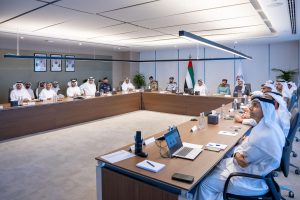ABU DHABI/WAM
The Abu Dhabi Petroleum Products Trading Regulatory Committee (TRC) convened its first meeting of 2025, headed by Dr Saif Saeed Al Qubaisi, Acting Director-General of Regulatory Affairs at the Department of Energy, and attended by representatives from 21 federal and local government entities.
The meeting’s agenda featured discussions on various subjects and included presentations concerning the ongoing efforts to organise the trading of petroleum products within the emirate.
Agreement was reached on the execution and monitoring of several recommendations and findings, consistent with the relevant legislation governing the regulation of petroleum products trading, namely Federal Law No (14) of 2017, its executive regulations as per Cabinet Resolution No (35) of 2019, and Law No (5) of 2023 pertaining to the regulation of these activities in Abu Dhabi.
The meeting commenced with ADNOC Distribution providing a summary of the beneficial effects of enforcing the petroleum products trading regulation decision, highlighting the role of the Department of Energy and the Abu Dhabi Petroleum Products Trading Regulatory Committee in shrinking the grey market and mitigating malpractices.
The committee emphasised the need to step up efforts to encourage the procurement of diesel fuel from approved national firms in the country. Concurrently, work should focus on guiding all users of petroleum products, across both public and private sectors, to collaborate with national companies in formalising supply agreements for petroleum products that meet certified standards. The objective is to guarantee adherence and the implementation of safety standards consistent with enacted legislations.
Additionally, ADNOC Distribution presented a plan designed to encourage the adoption of advanced gas cylinders. The presentation detailed the benefits and technical characteristics of these cylinders in contrast to the conventional steel cylinders presently utilised in residential, commercial, and industrial settings, especially facilities lacking centralised LPG supply systems. This move is poised to significantly improve public safety.
Abu Dhabi Ports also provided a comprehensive elaboration on a proposed project for the construction of gas cylinder storage facilities within Abu Dhabi’s ICAD 2 zone, designed to guarantee adherence to safety and environmental criteria.
Meanwhile, the Ministry of Energy and Infrastructure outlined its initiatives, undertaken in coordination with relevant entities, to set procedures, requirements, and regulatory structures allowing companies to import petroleum products into the UAE markets. Currently, the Ministry is implementing controls and requirements for the import of 98 petroleum materials and intends to expand this list to 211 regulated petroleum products over the course of the current year.
The Department of Energy’s Petroleum Products Regulatory Affairs Sector team reviewed the latest developments in their ongoing work, which involves consistent coordination with all federal and local entities and electronic integration, with the goal of accelerating the regulatory process for obtaining petroleum product trading licenses through the DoE’s Unified Platform.
Concluding the session, attendees were briefed on the accomplishments and initiatives of the Permits Working Group, followed by a presentation from the Inspection and Enforcement Group outlining the violations identified.
The Committee directed recommendations designed to reduce such malpractices via awareness campaigns, site visits, and inspection initiatives, ensuring adherence to regulations and the implementation of safety standards consistent with enacted laws.
The Committee emphasised the need for coordination between concerned government entities to initiate inspection and oversight campaigns against unlawful activities involving the trade of petroleum products non-compliant with certified local standards.
 The Gulf Time Newspaper One of the finest business newspapers in the UAE brought to you by our professional writers and editors.
The Gulf Time Newspaper One of the finest business newspapers in the UAE brought to you by our professional writers and editors.
